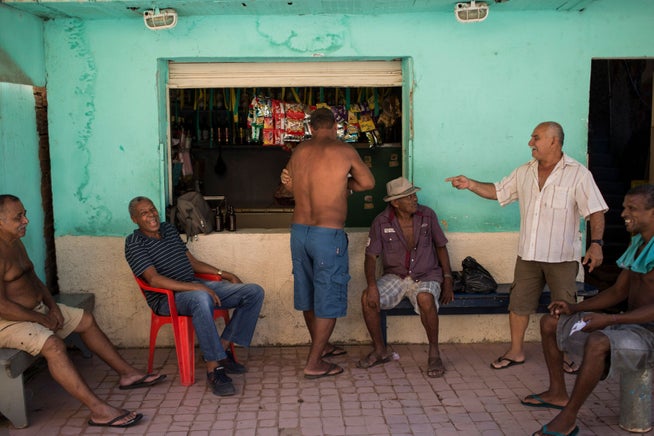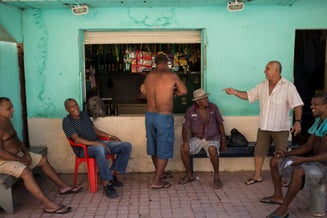Members of Brazil’s poor population are losing vast sums of money through online gambling services. Very few people are prepared for the treacherous business models of digital betting platforms.

Betting fever is taking its toll on Brazilian society. A quarter of all social welfare payments ends up in the accounts of digital betting providers.
Online betting has gripped Brazil like a fever. According the country’s central bank, Brazilians currently bet around 20 billion real, the equivalent of $3.7 billion, on digital gambling platforms every month. About 24 million people in the country have placed a digital bet at least once in 2024. This corresponds to about a quarter of the working population. Most of the gamblers are between 20 and 30 years old.
What many of them have in common is that they are living in poverty. According to a study by the Locomotiva Institute, which examines the consumption habits of the poorest income groups, almost one in four low-income families that have between $230 and $1,600 a month at their disposal places bets at least once a month. Around 86% of this population is in debt.
About one-quarter of the funds paid out nationwide through the Bolsa Familia social assistance program now ends up in the accounts of digital betting providers every month. And that’s where it stays. According to Locomotiva’s research, only about one-third of the poor gamblers withdraw their winnings and spend them outside of the betting service.
Brazil is the third-largest digital betting market in the world
According to management consultants PricewaterhouseCoopers, Brazil is already the third-largest online betting market in the world, after the United States and the United Kingdom. The English term «bets» has now entered common parlance in Brazil. This is proving useful for the industry’s public image, as in Brazilian Portuguese, the word for «gambling» is «jogo de azar,» which directly translates to «games of bad luck.»
The widespread gambling addiction is now having a real economic impact. Despite solid overall growth rates, high employment rates and significant wage increases since 2022, the country’s lower income brackets have not yet regained the relative purchasing power they had before the pandemic, according to PricewaterhouseCoopers. Banks, as well as fashion, furniture and consumer goods retailers, are all struggling with stagnating or collapsing sales.
The wave of costs that will hit public health care systems as a result of rampant gambling addictions will be felt only in the medium term. Experts expect the number of people seeking help in clinics to rise rapidly. The National Association of Games and Lotteries has now announced its intention to offer therapy to 21,000 gambling addicts as part of a voluntary pilot project.
Online gambling services were legalized in Brazil only in 2018. However, successive governments have failed to regulate the sector. This has led to a proliferation of digital platforms. There are several reasons why betting fever has broken out in Brazil within such a short space of time.
First, these betting platforms’ business model specifically targets poor Brazilians. The aim is to take as much money out of their pockets as possible, as quickly as possible.
Tradition of betting in Brazil
This also works so well because Brazil already has a popular tradition of gambling. The «jogo do bicho,» or «animal game,» is a nationwide lottery game that has existed since 1892, despite being illegal since 1946. «Rifas,» which are privately organized neighborhood lotteries in which people can win anything from a food basket to a motorcycle, have always been popular. Even the «consórcios» (roughly «consortium purchases») organized by international corporations in Brazil incorporate elements of gambling. These are sales models in which closed groups of people are invited to participate, for instance when making car or house purchases.
Yet in contrast to these more traditional forms of gambling, digital betting is intense and spontaneous, while utterly lacking transparency. Almost everyone in Brazil owns a smartphone and uses it for several hours a day. Algorithms ensure that potential gamblers are drawn persistently into the digital betting world. They don’t have to spend days or weeks waiting for the results of their bets. Reward and disappointment are just a click away, and the experience can be repeated immediately. Experts compare gambling addiction to crack cocaine – this is how quickly and brutally people are drawn into the betting labyrinth.
Moreover, thanks to the industry’s high profit margins, companies are prepared to invest vast sums in marketing. They spend considerable amounts of money to hire pop stars, influencers, football clubs and their best players, rodeo stars, and even child influencers to advertise their supposed online winnings to the public.
As a result, online betting has rapidly become immensely popular. It is also playing an increasingly important role on the financial market. According to a survey by the Brazilian Financial and Capital Markets Association, a fifth of the people using digital betting services in Brazil actually believe that they are «investing» their money – and not engaging in high-risk «gambling.»
A perfect machine for money laundering
Even members of parliament, senators, governors and high-ranking judges are being drawn in by betting service operators and owners, who are offering these figures access to luxury trips and possibly illegal shares in the gambling firms.
Just recently, musician Gusttavo Lima, one of Brazil’s leading pop stars, was briefly arrested on suspicion of money laundering and involvement in a gambling firm that prosecutors say laundered the equivalent of around $500 million. When Lima flew his private jet to a birthday party on a yacht off Mykonos, he was accompanied by a federal judge and a governor – as well as two gambling entrepreneurs who prosecutors say used the flight as an opportunity to flee the country and escape arrest.
As most of the betting services are based abroad, they are not subject to Brazilian transparency regulations. Monitoring them is therefore difficult. This makes the sector attractive to organized crime. Online betting is thus a perfect machine for money laundering.
This even applies in the case of legal providers in Brazil that pay tax on their profits. They also offer a tempting channel for laundering illegal proceeds from drug trafficking, for instance. Policing and auditing the sector demands a considerable expenditure of official resources. And once taxed, the profits are legal.
Given the enormous societal damage being caused by gambling, the government now wants to take countermeasures, in part by banning and shutting down illegal betting services. As of January 2024, the state will begin issuing licenses for providers. Until recently, the industry’s congressional lobby was still boasting about the additional tax revenue generated by digital betting services – as was the government itself. Now both have fallen silent in the face of public pressure. The government in particular is today engaged in damage control.
But the industry is still going strong. According to a forecast by industry service provider Regulus Partners, turnover in the Brazil’s digital betting sector is expected to grow by 18% annually at least until 2030. A total of 98 companies have applied for the legal licenses that will be issued in January. They collectively operate 200 betting platforms. The phenomenon of online betting will thus continue to occupy Brazil for some time to come.
Latest articles
Global reporting. Swiss-quality journalism.
In today’s increasingly polarized media market, the Switzerland-based NZZ offers a critical and fact-based outside view. We are not in the breaking-news business. We offer thoughtful, well-researched stories and analyses that go behind the headlines to explain relevant events in the U.S., in Europe and worldwide. To produce this work, the NZZ maintains an industry-leading network of expert reporters around the globe who work closely with our main newsroom in Zurich.
Sign up for our free newsletter or follow us on Twitter, Facebook or WhatsApp.
